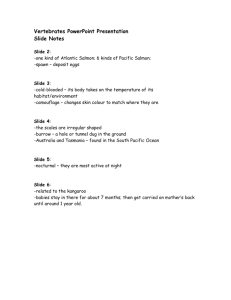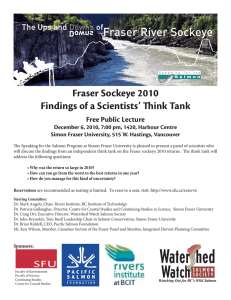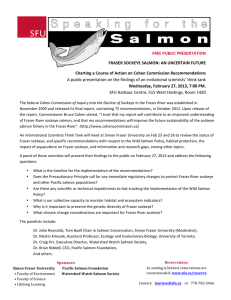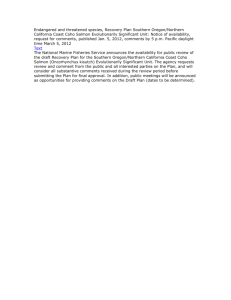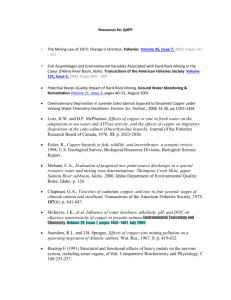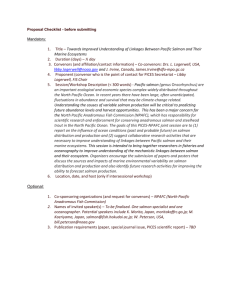Understanding Stock Declines and Prospects for the Future www.sfu.ca/cstudies/science
advertisement
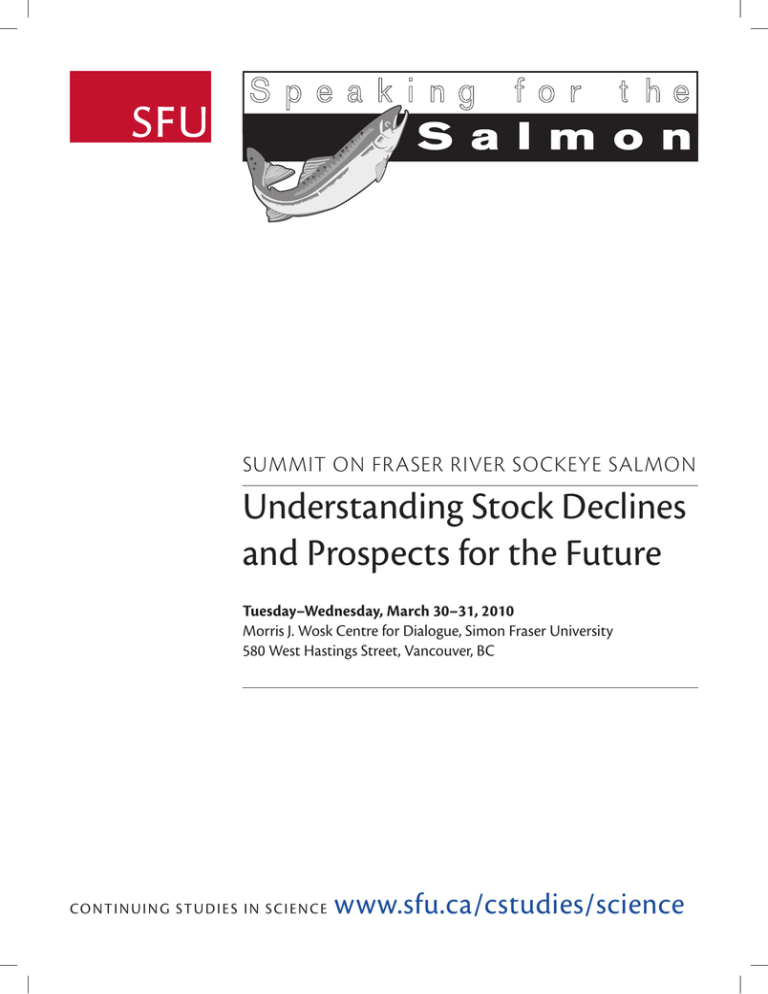
Summit on Fraser River Sockeye Salmon Understanding Stock Declines and Prospects for the Future Tuesday–Wednesday, March 30–31, 2010 Morris J. Wosk Centre for Dialogue, Simon Fraser University 580 West Hastings Street, Vancouver, BC Co n t i n u i n g St ud i e s i n S c i e n c e www.sfu.ca/cstudies/science Objective A scientists’ think tank met on December 7–8, 2009, to consider the causes of the unusual and unexpectedly low returns for Fraser River sockeye salmon in 2009. They examined these questions: • Is marine/ocean survival the problem? • What other factors must be considered to develop a better understanding of marine and freshwater survival? • Do forecasts provide useful information to fisheries managers? • How can we improve monitoring and management in a changing world? • Where should research be focused? Their findings were published in a statement which is available at: www.sfu.ca/cstudies/science/adaptingtochange.htm This website also includes information about the scientists and some of the resource materials considered in their review. The Summit on Fraser River sockeye will review the findings of the think tank in relation to the questions that were posed and seek solutions from a broader audience to ensure survival of Fraser River sockeye for future generations. Taking a life cycle stage approach, we will follow sockeye from their emergence from the gravel to the time they return as adults, to gain a detailed understanding of the challenges they face, and what can and should be done to ensure their survival for generations to come. [2] Context for Dialogue All proceedings will be recorded to support the postworkshop report. Photographs may also be included. The report will include a synthesis of perspectives and will be available electronically after the Dialogue. Guidelines for Dialogue These guidelines are designed to create opportunities to maximize participation, foster a safe place for dialogue, enable vigorous differences to surface without disrespecting anyone, promote an open and full exchange of information/ideas and generate an environment of shared learning. • Presenters/responders respect time by keeping to their allotted timeframe. • Participants respect time through concise comments and questions. • Participants identify themselves when speaking. • Participants listen and speak with respect. • Participants try to find a good way to say difficult things. • Let there be humour, when we explore tough issues, with a spirit of learning, creating a healthy and constructive learning environment. • If there are any questions or concerns please bring them to the session Chair. Tuesday, March 30, 2010 Day 1: Challenges to Sockeye Asia Pacific Hall—Room 100 8:00 am Registration and light refreshment 8:30 am Welcome John Pierce, Dean, Faculty of Environment, Simon Fraser University 8:45–9:30 am Report from the December Think Tank of Scientists 10-minute presentations followed by discussion. Chair: John Pierce, Dean of Faculty of Environment, Simon Fraser University Mike Lapointe, Chief Biologist, Pacific Salmon Commission Mark Angelo, Chair, Pacific Fisheries Resource Conservation Council John Reynolds, Tom Buell Leadership Chair in Salmon Conservation, Simon Fraser University John Henderson, Councillor, Weiwaikum Band and Member, First Nations Fisheries Council 9:30–10:30 am Panel I: Fry emergence and migration to sea 10-minute presentations followed by discussion. Chair: Craig Orr, Executive Director, Watershed Watch Salmon Society Mike Lapointe, Chief Biologist, Pacific Salmon Commission David Welch, Kintama Research Corporation • What is the “typical” life history of sockeye and what can we learn by comparing typical lake rearing populations (Chilko) with atypical, non-lake rearing populations (Harrison Rapids)? • How do we know how many fish go to sea? • What is the variation in freshwater productivity; is diversity important? • What do we know about mortality during downstream migration? • What are the general trends and issues related to freshwater sockeye stewardship? 10:30 am Break 10:45 am–12 noon Panel II: Smolts enter nearshore marine environments 10-minute presentations followed by discussion. Chair: John Reynolds, Tom Buell Leadership Chair in Salmon Conservation, Simon Fraser University Andrew Trites, Professor, Marine Mammal Research Unit, Fisheries Centre, University of British Columbia Michael Price, M.Sc. Candidate, Biology, University of Victoria Alexandra Morton, Director, Salmon Coast Field Station • What stressors may be encountered? 12 noon Lunch, ICBC Concourse (downstairs) 1:00–1:45 pm Panel III: High Seas 10-minute presentations followed by discussion. Chair: Craig Orr, Executive Director, Watershed Watch Salmon Society Sonia Batten, Sir Alister Hardy Foundation for Ocean Sciences, presented by David Welch, Kintama Research Corporation Skip McKinnell, Deputy Executive Secretary, North Pacific Marine Science Organization • Where and when do sockeye feed in the high seas? • What are the recent survival and climate trends? 1:45–4:00 pm Panel IV: The return migration • What stressors may be encountered on the long trek back to natal streams and what data are available with respect to survival bottlenecks for sockeye? • What is the quality of pre-season forecasts of adult abundance? • What is the fishing mortality by gear, area, and historical trends? • What is the potential impact of climate change in terms of thermal stress in marine and freshwater environments? • What are the trends in productivity (recent escapements, mortality events)? 10-minute presentations followed by discussion. Chair: Mark Angelo, Chair, Pacific Fisheries Resource Conservation Council Randall Peterman, Professor, Resource and Environmental Management, Simon Fraser University Mike Lapointe, Chief Biologist, Pacific Salmon Commission Break (15 minutes) [3] The return migration (continued) Karl English, Past President, LGL Ltd. Scott Hinch, Professor, Institute for Resources, Environment and Sustainability and Department of Forest Science, University of British Columbia—Adult Sockeye Salmon: Challenges to Complete the Journey and Spawn 4:00 pm End of Day One 4:15 pm Special Viewing—End of the Line Introduction by Ken Wilson, Member, Canadian Caucus, Fraser Panel on diversity Viewing followed by panel of respondents: Daniel Pauly, Member, Fisheries Centre, University of British Columbia John Nightingale, President, Vancouver Aquarium Marine Science Centre Based on the 2004 book, The End of the Line, this film follows the investigative reporter Charles Clover as he confronts politicians and celebrity restaurateurs, who exhibit little regard for the damage they are doing to the oceans. “The End of the Line is not against fishing. It is not against eating fish. But it is for a responsible attitude towards the oceans.” “We are given glimpses of hope and … this shines from the eyes of … eminent marine biologists. Each speaks with an insistent optimism, and as the story unfolds it is obvious why. This is not an insoluble problem. The answers are already known — all that is required is to get them into the minds of those making the decisions. … After decades in the wilderness, warning about the coming crisis, people are starting to sit up and pay attention. No new knowledge is required — just action.” [4] Wednesday, March 31, 2010 Day 2: What Can We Do? Asia Pacific Hall – Room 100 8:00 am Light Refreshment 8:30–9:15 am Panel V: Review of Day One including results from the December Scientists’ Think Tank and Recommendations for Action 10-minute presentations followed by discussion. Mark Angelo, Chair, Pacific Fisheries Resource Conservation Council John Reynolds, Tom Buell Leadership Chair in Salmon Conservation, Simon Fraser University • Is marine/ocean survival the problem? • What other factors must be considered to develop a better understanding of marine and freshwater survival? • How can we improve monitoring, pre-season and in-season management in a changing world? • Where should research be focused? 9:15–10:45 am Panel VI: Putting a value on salmon—social, economic, ecological and cultural considerations Chair: Craig Orr, Executive Director, Watershed Watch Salmon Society 15-minute presentation followed by discussion Kai Chan, Canada Research Chair and Assistant Professor, Institute for Resources, Environment and Sustainability, University of British Columbia 10-minute presentations followed by discussion. Kelsey Charlie, Councillor, Culture Portfolio, Chehalis Band Ken Wilson, Member, Canadian Caucus, Fraser Panel What does Fraser River sockeye mean to society in broad social, cultural and economic terms? • Food, social and ceremonial fisheries • Commercial net fisheries and Recreational fisheries • Other social/cultural/economic/ecosystem services concerns 10:45 am Break 11:00 am–12:15 pm Panel VII: What actions can be taken over the short and long terms? 10-minute presentations followed by discussion. Chair: Mark Angelo, Chair, Pacific Fisheries Resource Conservation Council What stewardship and stock recovery initiatives are underway or needed? Case Studies: • Salmon Stronghold Ken Beeson, Pacific Fisheries Resource Conservation Council • Water conservation Craig Orr, Executive Director, Watershed Watch Salmon Society • Contaminants and sewage Ken Ashley, Instructor, School of Construction and Environment, BC Institute of Technology • Change to land-based, closed-containment aquaculture Andy Wright, Member, Save Our Salmon Foundation 3:00–3:15 pm Break 3:15–5:00 pm Panel IX: How do we move forward and who pays for this? 10-minute presentations followed by discussion. Chair: Iona Campagnolo, Member, Collaborative Watershed Governance Initiative Chief Allan Claxton, Tsawout First Nation and Co-Chair, BC First Nations Fisheries Council John Fraser, Member, Pacific Fisheries Resource Conservation Council Rick Routledge, Professor, Statistics and Actuarial Sciences, Simon Fraser University David Anderson, Former MP and Minister of Environment John Nightingale, President, Vancouver Aquarium Marine Science Centre Closing Remarks: Iona Campagnolo 12:15 pm Lunch, ICBC Concourse (downstairs) 1:00–3:00 pm Panel VIII: What tools do we have? 10-minute presentations followed by discussion. Chair: Patricia Gallaugher, Director, Centre for Coastal Studies, Simon Fraser University • Salmon Genomics Willie Davidson, Professor, Molecular Biology and Biochemistry, Simon Fraser University and co-Principal Investigator of the Consortium for Genomic Research on all Salmonids Project • The Species at Risk Act Arne Mooers, Associate Professor, Biological Sciences, Simon Fraser University • Water Act Reform Linda Nowlan, Environmental Lawyer and Consultant with Watershed Watch Salmon Society • Integrated Salmon Dialogue Forum Glenn Sigurdson, Facilitator, Integrated Salmon Dialogue Forum and Principal, CSE Group • Fisheries Monitoring and Compliance Initiatives Craig Orr, Executive Director, Watershed Watch Salmon Society • Wild Salmon Policy Terry Glavin, Writer/Researcher For information about Speaking for the Salmon initiatives, visit our website at www.sfu.ca/cstudies/science/salmon.htm Contact us Continuing Studies in Science Simon Fraser University 8888 University Drive, Burnaby, BC V5A 1S6 Tel 778-782-5466 • Email cs-science@sfu.ca [5] Participant Biographies The Honourable David Anderson was born in Victoria seventy-three years ago. He has been an active conservationist, particularly in the area of protecting our coastline from oil tanker traffic and offshore drilling. He served both as an MLA and an MP and served in the cabinet of Prime Minster Chretien as both Fisheries Minister (1997– 99) and as Environment Minister (1999–2004). Mark Angelo, Chair of the Pacific Fisheries Resource Conservation Council, is a noted river conservationist, outdoor leader, teacher and writer. He is the Chair of the Rivers Institute as well as Program Head of the Fish, Wildlife and Recreation Department at the British Columbia Institute of Technology. He is the founder and chair of BC Rivers Day, and also chairs World Rivers Day. Mark is a recipient of the Order of Canada and also holds the Order of British Columbia, in recognition of outstanding achievement in preserving Canada’s waterways. He was the first recipient of the National River Conservation Award as Canada’s most outstanding river conservationist in the past decade and he received the inaugural United Nations Stewardship Award. His involvement with conservation issues in British Columbia spans four decades and he has published close to 300 articles and editorials. In June 2009, Dr. Angelo received an honourary doctorate in science from Simon Fraser University. Ken Ashley earned his BSc and MSc in Zoology, and MASc and PhD in Civil/Environmental Engineering from UBC. He worked for the Fisheries Research and Development Section of the BC Ministry of Environment for 25 years where he developed a variety of innovative lake aeration, lake and stream fertilization and habitat restoration solutions. From 2005–2007, Ken worked at the Greater Vancouver Regional District as Senior Engineer in the Utility Analysis and Environmental Management Division to learn about the deleterious effects of municipal wastewater discharges and drinking water withdrawals on aquatic ecosystems. He returned to the Ministry of Environment in 2008 where he was the provincial contact for the Living Rivers Program and other habitat restoration /compensation programs. A member of the Salmon 2100 project team, Ken is currently an instructor at the BC Institute of Technology in the new undergraduate degree program in Ecological Restoration, and an Adjunct Professor of Civil Engineering at UBC, in addition to operating his own ecological engineering consulting company. [6] Sonia Batten completed her PhD at Southampton University in the UK and then began a post-doc with the Sir Alister Hardy Foundation for Ocean Science working on the north Atlantic Continuous Plankton Recorder survey. In 2000 she moved to Nanaimo, BC and coordinated the setting up of the north Pacific CPR survey, now in its 11th consecutive year and supported by a consortium of funding agencies including DFO. Sonia’s experience is in biological oceanography, particularly the large scale dynamics of zooplankton and their role in the oceanic ecosystem. Ken Beeson is the Managing Director of the Vancouverbased Public Policy Management consulting firm specializing in environmental and health fields. He has been a senior executive in the private sector and has led national not-forprofit organizations, including serving as interim President and Chief Executive Officer of the International Centre for Infectious Diseases. He has worked for more than eleven years as a policy advisor to the Pacific Fisheries Resource Conservation Council and has authored several reports on salmon issues. The Honourable Iona Campagnolo has had a long career in representing the interests of British Columbians, serving both in public office and in her private capacity. Ms. Campagnolo has assisted in Speaking for the Salmon series and other SFU Continuing Studies in Science initiatives since 1995. The founding Chancellor of The University of Northern British Columbia, Ms. Campagnolo was also the founding Chair of the Fraser Basin Council and is an honourary SFU Alumna. She is an Officer in the Order of Canada and a Member of the Order of British Columbia and served as the first woman and 27th Lieutenant Governor of our Province from 2001 to 2007. Kai Chan is an assistant professor and Canada Research Chair (tier 2) at the Institute for Resources, Environment and Sustainability at the University of British Columbia. Kai is a Canadian who received his PhD from Princeton University and a postdoctoral fellowship from Stanford University. His research is interdisciplinary and policy-relevant, in three primary areas: (1) biodiversity and ecosystem services (the processes by which ecosystems benefit people, directly and indirectly); (2) biological infestations and invasions; and (3) applied environmental ethics. In all, he strives to understand the workings of and values associated with social-ecological systems, in order to facilitate decision-making that promotes human well-being and social and ecological justice. Kai leads the Conservation Collaboration in Interdisciplinary Study of Ecosystems (www.conciseresearch.net); he is a director on the board of the BC chapter of the Canadian Parks and Wilderness Society (CPAWS), a columnist at the Vancouver Metro, and a senior fellow of the Environmental Leadership Program. Participant Biographies Kelsey Charlie is a Councillor with the Chehalis First Nation. He holds the Culture portfolio among many other responsibilities. Chief Allan Claxton (Sxed Qel A’new) has been the Chief of the Tsawout First Nation for the past sixteen years. During his tenure, Tsawout has taken charge of their sewage treatment plant, implemented a lands management program and introduced taxation. Chief Claxton’s goal is to move his community into self-sufficiency through self-government, with the ultimate goal being a healthy community in control of its own destiny. Chief Claxton currently serves as a cochair of the BC First Nations Fisheries Council, and as a BC representative for the Assembly of First Nations National Fisheries Committee. He is also a board member for the Centre for Indigenous Environmental Resources, a member of the Regional Chiefs’ Health Committee, a member of the Chiefs’ Committee on Health, and a BC Assembly of First Nations representative for the Leadership Council of Health. He has also served as the national representative for Health Technicians. He loves spending time with his wife, their five children, and their grandchildren. He enjoys golfing and the outdoors. Willie Davidson is a Professor in the Department of Molecular Biology and Biochemistry at Simon Fraser University. His research interests are broad, but are all in the general field of molecular evolution. He has investigated population structuring in Atlantic salmon and Arctic char as well as the interactions between, and the hybridization of, brown trout and Atlantic salmon. For the past ten years he has been involved in salmonid genomic research, and was a co-PI of the Genome Canada/Genome BC funded Consortium for Genomic Research on All Salmonids Project (cGRASP). He is currently involved with sequencing the Atlantic salmon genome, applying genomic techniques to salmonid broodstock development and examining the population genetics of sea lice. Karl English is a fisheries scientist with 29 years of professional experience working with LGL Limited on Pacific salmon fisheries. Karl has spent most of his career designing and implementing studies to improve the quality and quantity of information available for the management and assessment of Pacific salmon and steelhead stocks. Karl has conducted projects throughout BC, and in Washington State, Alaska and the Yukon. He has designed catch monitoring programs for commercial, sport and First Nation fisheries; directed multi-year studies to assess fish distribution, abundance and migration behaviour in coastal waters and large river systems; and provided expert advice to First Nations, industry, NGOs, university researchers and all levels of government. A sample of the salmon and steelhead projects directed by Mr. English include: the 1982–85 International Salmon Tagging Studies conducted in northern BC and southeast Alaska; the Nisga’a Fisheries Program; the 1986–99 Georgia Strait Creel Survey; the 1996–2002 Yukon River Basin Salmon Harvest Study; and radio telemetry studies to assess migration behaviour and abundance on the Nass, Skeena, Fraser, Bella Coola and Columbia rivers (1992-present). Mr. English has also directed research on other fish species including: white sturgeon, arctic cisco, broad whitefish, and reviewed research and stock assessment programs associated with the fisheries in the Canadian Great Lakes. In additional to his research and project management responsibilities, Karl has extensive experience in Treaty negotiations process through his role as fisheries advisor during the negotiation of the Nisga’a Treaty and Tsawwassen Treaty. The Honourable John Fraser graduated from the University of British Columbia and practised law until his election to the House of Commons. During his years in Parliament, he served in key positions, including Minister for the Environment and Minister of Fisheries. He was the first person to have been elected Speaker of the House of Commons by his peers, a practice instituted in 1986. In 1994, John Fraser was selected to head the Fraser River Sockeye Public Review Board investigating the salmon fishery. In September 1998, John Fraser was appointed Chair of the Pacific Fisheries Resource Conservation Council and remained as Chair until April 2005 and he currently remains a Council member. In December 2004, Mr. Fraser was appointed chair of British Columbia’s Pacific Salmon Forum. Patricia Gallaugher is Director of Continuing Studies in Science, Director of the Centre for Coastal Studies, and Adjunct Professor in Biosciences at Simon Fraser University. Dr. Gallaugher’s research on salmon physiology and selective fishing conducted in partnership with members of the BC commercial salmon fishing fleet, coastal communities and First Nations, the Province of BC and Fisheries and Oceans Canada was recognized in 2002 with the Vancouver Aquarium Murray A. Newman Award for Excellence in Aquatic and Marine Conservation Research which she received with Dr. Rick Routledge and Dr. Tony Farrell. Patricia has helped to develop a number of programs dealing with coastal and ocean resource sustainability issues in BC and Atlantic Canada. In 1998 she initiated the Speaking for the Salmon series of workshops, scientists’ roundtables and think tanks focusing on linking science to policy for the future sustainability of Pacific wild salmon. Dr. Gallaugher is a member of the Science Advisory Committee for the Canadian Healthy Oceans Network (CHONe), Board Member of Coastal Zone Canada, a co[7] Participant Biographies founder and member of the steering committee of the Canada Ocean Lecture and a co-investigator on the Consortium for Genomic Research on All Salmonids (cGRASP) Genome Canada/BC funded research project based at Simon Fraser University and the University of Victoria. Terry Glavin is a journalist, the author of eight non-fiction books, and an adjunct professor in the Creative Writing department at the University of British Columbia. His most recent book, Waiting for the Macaws, is published under separate titles in Canada, the United States, the UK and Germany. For this book, he traveled around the world to report on the impacts of globalization, biodiversity loss, and the vanishing of cultural and linguistic diversity. His book, The Last Great Sea: A Voyage Through the Human and Natural History of the North Pacific Ocean, was nominated for the Bill Duthie Prize and the Roderick Haig-Brown Non-Fiction Prize, and was the winner of The Hubert Evans Non-Fiction Prize. As a journalist and columnist for The Vancouver Sun, The Globe and Mail, the Georgia Straight and the Tyee, and a frequent contributor to such newspapers and magazines as Lettre International (Berlin), Canadian Geographic, the Vancouver Review and the Ottawa Citizen, Terry specializes in relating natural history to anthropology and contemporary cultural phenomena. He has won multiple awards for feature length essays, including several science-writing prizes, Western Magazine Awards and National Magazine Awards. Terry was the recipient of the 2009 Lieutenant-Governor’s Award for Literary Excellence. His new book, Come From The Shadows, to be published by Douglas and McIntyre, is set mainly in Afghanistan, where Terry is hoping to learn how to properly flyfish the Panjshir River. John Henderson is one of 17 children of the late master carver Samuel Henderson and May Henderson. John was given his name Tl’Wakgila (Holder of the Copper) in a memorial potlatch in the 70s that his father had for his mother. John was initiated into the Hamatsa society, which is a sacred dance given by Chiefs. John has worked with the Campbell River (Weiwaikum) Band for many years as a councilor, and also served as the Chief and is currently a band councilor. He has been working with the Kwakiutl District Council for the last 16 years, and is currently the vice chair. He has also been the chairman of the Hamtla Treaty for 8 years. John spent many years fishing with his parents, and then later fished on his uncle’s salmon seine boats. He became a skipper on a seine boat in 1982, and has worked in this business ever since. John always thanks his uncles for all the knowledge they gave him in the fishing industry, and credits them for his success. [8] Scott Hinch is a fisheries scientist in the Department of Forest Sciences and Centre for Applied Conservation Research at the University of British Columbia. Since joining UBC in 1994, he has developed two broad research programs: the study of salmon migration energetics, physiology, behaviour and survival; and, the study of land-use impacts on salmonids and their habitat. He collaborates extensively with colleagues studying physiology, biochemistry and genomics and uses an interdisciplinary approach to tackle pressing issues in the conservation and management of Pacific salmonids. Dr. Hinch has been studying Fraser River sockeye salmon ocean and freshwater migrations for the past 16 years and has participated in several past inquiries into “missing salmon.” He continues to lead an interdisciplinary research team investigating the early migration and high mortality phenomenon in late run Fraser sockeye, and the effects of climate change on Fraser sockeye. Mike Lapointe has a Bachelor of Science degree in Wildlife Management from the University of Maine and a Master of Science degree in Zoology (Fisheries) from the University of British Columbia. Mr. Lapointe has over 20 years experience in Salmon Assessment and Management. For the past 17 years, he has been a member of the Pacific Salmon Commission (PSC) staff, becoming its Chief of the Fisheries Management Division in 2002. As Chief, Mike leads a technical team of about 15 individuals that provide in-season assessments of return timing and abundance of Fraser River sockeye and pink salmon used by the bilateral Fraser River Panel to regulate harvests under the terms of the Pacific Salmon Treaty between Canada and the United States. In addition to in-season duties, Mr. Lapointe and his staff assist the Panel in developing pre-season plans and liaise with agency staff from both countries in areas related to salmon assessment and management. Skip McKinnell received a PhD in Fish Biology from Sveriges Lantbruksuniversitet (Swedish University of Agricultural Sciences) for research on the interaction of Atlantic salmon biology and the fishery. He was the first Lead Author of DFO’s Wild Salmon Policy and is a former chairman of their salmon assessment review sub-committee. He was Canada’s principal scientific investigator of the effects on large-scale driftnet fishing. Since 1999, he has been Deputy Executive Secretary of the international, intergovernmental North Pacific Marine Science Organization (PICES) where he is currently editor-inchief of a new PICES book on the status and trends in North Pacific marine ecosystems. His hobbies include the making of forecasts of Chilko Lake sockeye salmon returns at the annual salmon forecasting forum. Participant Biographies Arne Mooers is an Associate Professor of Biodiversity at Simon Fraser University. Dr. Mooers received his training from McGill and Oxford Universities and previously held research positions at the Zoological Museum of Amsterdam, the University of British Columbia, and is a past fellow of the Institute for Advanced Study in Berlin. He is the incoming Chair of the Biodiversity and Conservation Committee, and a member of the Executive Committee, of the Canadian Society for Ecology and Evolution, and he is lead author of a review of the Species at Risk Act for the Federal Parliament. Arne’s expertise is in phylogenetics, comparative evolutionary biology and ways to quantify biodiversity for conservation. (www.sfu.ca/~amooers ) Alexandra Morton is the director of the Salmon Coast Field Station in the Broughton Archipelago where she has lived and conducted research for 26 years. In addition to her wellknown research on orca whales, Alexandra has authored or co-authored seventeen peer-reviewed scientific papers on impacts of salmon farms. The author of a number of books and a Registered Professional Biologist, Alexandra is the recipient of the Roderick Haig-Brown Conservation Award (2005), the Vancouver Aquarium’s Murray A. Newman Award for Excellence in Aquatic Conservation (2006), and the Roland Michener Conservation Award (2008) among others. Ms. Morton was part of a research team that was the last to see the 2009 sockeye as they migrated out of the Strait of Georgia. John Nightingale has a broad professional background in aquatic sciences, specializing in using them to enhance public awareness, education and promote conservation. A professional biologist and public educator, Dr. Nightingale has been responsible for the development and operation of some of the world’s best aquariums. His background and lifelong work in public communications, and both formal and informal public education, make him a leader in the current rapid development of new conservation efforts in aquariums, zoos and museums. During his seventeen years at the Vancouver Aquarium, he has guided the expansion of the Aquarium’s leadership in conservation and research while focusing operations on sustainability and solid fiscal performance. As a result, the Vancouver Aquarium is not only one of the “greenest” cultural institutions in Canada, it is the only one that is financially self-sufficient, operating without an annual subsidy from Government. Linda Nowlan is a public interest environmental lawyer and independent consultant in Vancouver. Previously, she worked at West Coast Environmental Law, a public interest law organization, for ten years, after practicing civil litigation for five years. She has also worked for the Program on Water Governance at the University of British Columbia and the UK Foreign Office. Her water law publications cover topics such as groundwater regulation (Walter and Duncan Gordon Foundation), collaborative water governance (UBC Program on Water Governance commissioned by the province of BC), customary water law and aboriginal rights (UN Food and Agriculture Organization), water markets (Conference Board of Canada), and the human right to water (World Water Institute). Other environmental law publications include a guide to the Arctic environmental legal regime (IUCN), and a guide to international environmental treaties (WCELRF). She sits on the Greenest City Action Team for the City of Vancouver, the Board of the Sierra Club of Canada Foundation, and the Canadian Council of Academies’ Expert Panel on Groundwater. Ms. Nowlan is a member of the Law Society of BC, the IUCN Commission on Environmental Law, the ELAW Alliance, and is a Fellow of LEAD International. Craig Orr is a behavioural ecologist and the Executive Director of the Watershed Watch Salmon Society, where he promotes salmon conservation and public outreach. Dr. Orr has served as Associate Director of Simon Fraser University’s Centre for Coastal Studies, Chair of BC Hydro’s Bridge Coastal Restoration Program, Vice-Chair of the Habitat Conservation Trust Fund, and technical reviewer for the Pacific Salmon Endowment Fund, Pacific Salmon Commission, National Marine Fisheries Service, Fisheries and Oceans Canada, Vancouver Foundation, Friends of the Environment Foundation, and others. He also currently chairs the Pacific Marine Conservation Caucus, and the Monitoring and Compliance Panel of the Integrated Salmon Dialogue Forum. With Watershed Watch Craig has focused on a broad array of habitat and harvest issues, participating in numerous water use planning activities (Coquitlam Water Use Plan Consultative Committee, BC Hydro Fisheries Advisory Team, First Nations Water Use Planning Committee, Kwikwetlem Salmon Restoration Program), harvest planning committees (Integrated Harvest Planning Committee, Williams’ 2004 Sockeye Review Panel, Fraser Salmon Table, BC Aboriginal Fisheries Commission (selective fisheries coordinator), and other initiatives. Dr. Orr has worked extensively on the issue of aquaculture impacts for nearly a decade, authoring numerous technical reports and peer-reviewed studies, researching lice infestations on juvenile sockeye, and serving as science coordinator for the Coastal Alliance for Aquaculture Reform, where he oversees collaborative research and louse monitoring programs with Marine Harvest Canada. [9] Participant Biographies Daniel Pauly is a French citizen who completed his high school and university studies in Germany; his doctorate (1979) and habilitation (1985) are in Fisheries Biology, from the University of Kiel. After many years at the International Center for Living Aquatic Resources Management (ICLARM), in Manila, Philippines, Daniel Pauly became in 1994 Professor at the Fisheries Centre of the University of British Columbia, of which he was the Director for 5 years (Nov. ’03-Oct. ’08). Since 1999, he is also Principal Investigator of the Sea Around Us Project (see www.seaaroundus.org), funded by the Pew Charitable Trusts, and devoted to studying, documenting and promoting policies to mitigate the impact of fisheries on the world’s marine ecosystems. Randall Peterman is a Professor in the School of Resource and Environmental Management at Simon Fraser University. He holds a Canada Research Chair in Fisheries Risk Assessment and Management. Dr. Peterman’s research focuses on quantitative methods to improve the understanding and management of fish populations, particularly in the presence of uncertainties and conservation risks. His research group specializes in developing and applying quantitative methods to improve fisheries management, mostly related to Pacific salmon, through using large data sets, simulation models, Bayesian and other statistical methods, and formal decision analysis. Most relevant to this workshop is his group’s past research on developing and comparing the methods for preseason forecasting of abundances that are used by salmon management agencies on the west coast of North America. Randall’s group has received several international awards for the quality of its research. Randall has served on various policy advisory groups and helped to write the 1995 United Nations Food and Agriculture Organization’s Precautionary Approach to Capture Fisheries and he is a member of the Royal Society of Canada (RSC) Expert Panel on Ocean Climate Change and Marine Biodiversity. John Pierce has for the past 33 years served many diverse roles within Simon Fraser University as a researcher, teacher, administrator and community advisor. He has taught and published widely on topics relating to sustainable community development; food security, resource and environmental management/modelling; and public policy. As an administrator he served as Chair of the Department of Geography, Director of the Centre for Community Economic Development, Dean of the Faculty of Arts and Social Sciences; and most recently he serves as the inaugural Dean to the newly created Faculty of Environment at SFU. John received his PhD from the London School Of Economics. [ 10 ] Michael Price is a MSc candidate with the University of Victoria, and conservation biologist with Raincoast Conservation Foundation, where he is the project manager of their Juvenile Salmon Ecology Program. He is also a science advisor on wild salmon ecology with the Heiltsuk Nation. Michael has extensive field research experience, spanning multiple projects, and involving keystone and endangered species of terrestrial and marine systems. Michael’s most recent focus is on anthropogenic influences on the early marine survival of Fraser River sockeye. John Reynolds is a professor at Simon Fraser University, where he holds the Tom Buell BC Leadership Chair in Salmon Conservation and Management. His research focuses on understanding connections between salmon and their ecosystems, emphasizing implications for conservation and sustainability. This includes research on numerous streams in both the Fraser Basin and in the Great Bear Rainforest. Dr. Reynolds has held a wide range of scientific advisory positions, including the BC Pacific Salmon Forum and the Skeena Independent Science Review Panel. He has written five books and over 150 scientific articles on ecology and conservation. In 2000, he was awarded the FSBI Medal by the Fisheries Society of the British Isles, and in 2003 he received the J.C. Stevenson Award from the Canadian Conference for Fisheries Research. http://www.sfu.ca/reynolds Rick Routledge develops and applies statistical methodology in population biology and renewable resource management. Current projects include (i) coordination of and participation in ecosystem research on the British Columbia Central Coast, and (ii) collaborative research on interactions between fish farms, sea lice, and wild Pacific salmon. Dr. Routledge has also worked with the Pacific Salmon Commission on alterations to their hydroacoustic estimation of fish passage in the Fraser River, and has developed models for generating theoretical insight on mixed-stock fisheries, extinction risks, and incorporating uncertainty into forest management decisions. He served on the Fraser River Sockeye Public Review Board in 1994–1995, and was a founding member of the Pacific Fisheries Resource Conservation Council. Rick was a co-recipient of the Vancouver Aquarium Murray A. Newman Award for Excellence in Aquatic and Marine Conservation and Research in 2002. Participant Biographies Glenn Sigurdson is the lead Facilitator for the Integrated Salmon Dialogue Forum and Principal, CSE Group. His background includes experience as a mediator, facilitator, and negotiator; he also brings with him an extensive adjudicative background as an arbitrator in workplace, commercial, and healthcare disputes, and as the Senior Vice Chair of the Manitoba Labour Relations Board (1980–1989, part time). Glenn is associated with Simon Fraser University, where he is an adjunct Professor in the Learning Strategies Group in the Faculty of Business. He is also associated with the LL.M. Graduate Program in Dispute Resolution, Osgoode Hall Law School of York University in Toronto (2002–2003). He is a former President (1996) of the Society of Professionals in Dispute Resolution (SPIDR), now known as the Association for Conflict Resolution, the pre-eminent international organization in the ADR field, headquartered in Washington, D.C. He has recently been appointed to the NAFTA Advisory Group, established under Article 2022 of the NAFTA Agreement to deal with international private commercial disputes as one of the Canadian non-government members. Andrew Trites is Director of the Marine Mammal Unit at the UBC Fisheries Centre and Research Director of the North Pacific Universities Marine Mammal Research Consortium. He is also a member of the Marine Mammal Specialist Group for the Committee on the Status of Endangered Wildlife in Canada (COSEWIC), and a member of the PICES Advisory Panel on Marine Birds and Mammals. Dr. Trites has been studying marine mammals in the North Pacific for over 30 years. His current research is primarily focused on pinnipeds (Steller sea lions, northern fur seals and harbor seals), and involves captive studies, field studies and simulation modeling. Some of his work includes modeling the Bering Sea ecosystem, estimating the extent of competition between marine mammals and fisheries, and evaluating the junk-food hypothesis thought by many to explain the decline of Steller sea lions in Alaska. He trains students and collaborates with researchers specializing in other disciplines (such as nutrition, ecology, physiology and oceanography). His graduate students have worked on a variety of subjects including harbour seal genetics, killer whale / vessel interactions, Steller sea lion behavior, pinniped energetics, GIS mapping of marine mammal critical habitat, and predation on salmonids. David Welch is the president and founder of Kintama Research Corporation. David has a BSc in Biology and Economics from the University of Toronto and a PhD in Oceanography from Dalhousie University. For the first 20 years of his career David worked for DFO’s Pacific Biological Station in Nanaimo. David developed the original concept of building continental-scale marine tracking arrays to resolve critical issues in salmon management. David founded Kintama to begin evaluating sensor technology for this purpose, and to develop the required technology for building large-scale & highly efficient telemetry arrays. Ken Wilson is a representative of the Marine Conservation Caucus, serving on the Integrated Harvest Planning Committee, and the Canadian caucus of the Pacific Salmon Commission’s Fraser Panel. After completing his post-graduate work at the University of BC in 1980, Ken began his career with DFO, Fraser River Division, as a fisheries manager and stock assessment biologist, leaving in 1997 to assume responsibilities as the Stock Management coordinator for the Fraser River Aboriginal Fisheries Secretariat. In this capacity, Mr. Wilson chaired the Fraser Watershed Stock Management Committee and served on the Marine Fish Species Specialist Group of the Committee on the Status of Endangered Wildlife in Canada (COSEWIC). Andrew Wright graduated from the University of Hull, England with a first class honors Bachelor of Science, a Diploma of Engineering and a Doctorate in Microwave Engineering. He has published numerous IEEE peer-reviewed research papers and has been awarded over 50 patents. After emigrating to Canada, Dr. Wright co-founded and was CTO of Datum Telegraphic Inc. Datum was subsequently acquired by PMCSierra. He is currently a Director of Actenum, Zymeworks, and Pharos Capital and a co-founder of Aegis Mobility. Dr. Wright is a proponent of environmental stewardship initiatives. He is a lead donor for the Tides Canada Great Bear Rainforest initiative, which promises to be a model for world conservancy. Upon visiting the Broughton Archipelago and witnessing the impact of open net-cage salmon farming, he has become an advocate for improving salmon aquaculture practices on the West Coast. [ 11 ] Thank You to Our Sponsors BC Institute of Technology, Rivers Institute Gordon and Betty Moore Foundation Ocean Management Research Network Pacific Salmon Foundation Watershed Watch Salmon Society Simon Fraser University • Centre for Coastal Studies • Faculty of Environment • Faculty of Science Pacific Fisheries Resource Conservation Council Steering Committee Mark Angelo, Chair, Pacific Fisheries Resource Conservation Council and Chair, Rivers Institute, BC Institute of Technology Patricia Gallaugher, Director, Centre for Coastal Studies and Continuing Studies in Science, Simon Fraser University Craig Orr, Executive Director, Watershed Watch Salmon Society John Reynolds, Tom Buell Leadership Chair in Salmon Conservation, and Professor, Biological Sciences, Simon Fraser University Brian Riddell, CEO, Pacific Salmon Foundation Ernie Victor, Manager, Aboriginal Community Liaison, Fraser Basin Council
